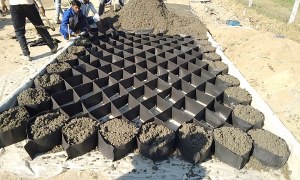🕑 Reading time: 1 minute
Geopolymer concrete is an innovative and eco-friendly construction material and an alternative to Portland cement concrete. Use of geopolymer reduces the demand of Portland cement which is responsible for high CO2 emission.Contents:
What is Geopolymer Concrete?
Geopolymer was the name given by Daidovits in 1978 to materials which are characterized by chains or networks or inorganic molecules. Geopolymer cement concrete is made from utilization of waste materials such as fly ash and ground granulated blast furnace slag(GGBS). Fly ash is the waste product generated from thermal power plant and ground granulate blast furnace slag is generated as waste material in steel plant. Both fly ash and GGBS are processed by appropriate technology and used for concrete works in the form of geopolymer concrete. The use of this concrete helps to reduce the stock of wastes and also reduces carbon emission by reducing Portland cement demand. The main constituent of geopolymers source of silicon and aluminium which are provided by thermally activated natural materials (e.g. kaolinite) or industrial byproducts (e.g. fly ash or slab) and an alkaline activating solution which polymerizes these materials into molecular chains and networks to create hardened binder. It is also called as alkali-activated cement or inorganic polymer cement.Composition of Geopolymer Concrete
Following materials are required to produce this concrete:- Fly ash - A byproduct of thermal power plant
- GGBS - A byproduct of steel plant
- Fine aggregates and coarse aggregates as required for normal concrete.
- Alkaline activator solution for GPCC as explained above. Catalytic liquid system is used as alkaline activator solution. It is a combination of solutions of alkali silicates and hydroxides, besides distilled water. The role of alkaline activator solution is to activate the geopolymeric source materials containing Si and Al such as fly ash and GGBS.

Mechanical Properties of Geopolymer Concrete
Compressive strength of geopolymer concrete have been found up to 70 MPa (N/mm2). The concrete gains its compressive strength rapidly and faster than ordinary Portland cement concrete. The concrete strength after 24 hours have been found to be more than 25 MPa. Compressive strength after 28 days have been found to be 60 to 70 MPa. -Ref. Paper by - James Aldred And John Day and Test results by SERC Chennai.Other Properties of Geopolymer Concrete:
- The drying shrinkage of is much less compared to cement concrete. This makes it well suited for thick and heavily restrained concrete structural members.
- It has low heat of hydration in comparison with cement concrete.
- The fire resistance is considerably better than OPC based concrete. -Reference - Paper by - James Aldred And John Day.
- This concrete jas chloride permeability rating of ‘low’ to ‘very low’ as per ASTM 1202C. It offers better protection to reinforcement steel from corrosion as compared to traditional cement concrete.
- This concrete are found to possess very high acid resistance when tested under exposure to 2% and 10% sulphuric acids.
Applications of Geopolymer Concrete
The applications is same as cement concrete. However, this material has not yet been popularly used for various applications. This concrete has been used for construction of pavements, retaining walls, water tanks, precast bridge decks.


